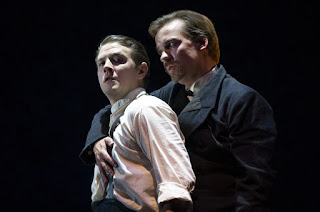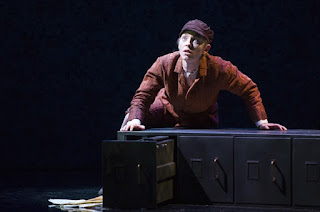 |
| Susannah Hurrell - photo credit Richard Hubert Smith |
Reviewed by Robert Hugill on Oct 1 2015
Star rating:
Enterprising reduced scale Pelleas
Debussy's opera Pelleas et Melisande is one of those seminal works which fascinates even the opera companies who lack the resources to perform it; though the work is relatively economical with singers and not too long, it needs a very large orchestra. Some years ago, Independent Opera performed it in a reduced orchestration at the Sadlers Wells, Lilian Baylis Studio, and more recently it was performed at the Grimeborn Festival with just a piano. English Touring Opera too has heard the siren call, and as part of its enterprising French opera season is performing Debussy's Pelleas et Melisande in Annalies van Parys abridged orchestral reduction (alongside Massenet's Werther and Offenbach's The Tales of Hoffmann).
We caught the opening night of English Touring Opera's Autumn tour, 1 October 2015, when James Conway's new production of Pelleas et Melisande was performed at the Britten Theatre, Royal College of Music, with Michael Druiett as Arkel, Helen Johnson as Genevieve, Stephan Loges as Golaud, Jonathan McGovern as Pelleas, Lauren Zolezzi as Yniold and Susanna Hurrell as Melisande. Jonathan Berman conducted, designs were by Oliver Townsend, lighting by Mark Howland, movement by Bernadette Iglich and video by Zakk Hein.
 |
| Susannah Hurrell, Jonathan McGovern photo credit Richard Hubert Smith |
James Conway and Oliver Townsend set the piece in a box, atmospherically green-blue in colour, and both Mark Howland's lighting and Zakk Hein's videos (projected onto the rear wall) helped to create the right sense of atmosphere. In something of a coup, part of the rear wall became transparent to reveal a warm pink room which was the interior space occupied by Arkel. Costumes were moderately neutral and seemed to be placed loosely in the Edwardian period.
It must frustrate performers to rehearse for weeks and then after opening night, have reviewers commenting that the production was promising but will need time to bed down, but that is what I am going to do. The drama in Pelleas et Melisande comes as much from the way the characters do not interact as in the dialogue. The spaces between the characters are as important as what they say. All this arises from Maeterlink's elusive dialogue and the way Debussy sets it surrounded by a web of orchestral allusion.
 |
| Jonathan McGovern, Stephan Loges photo credit Richard Hubert Smith |
That said, Susanna Hurrell made a fine Melisande, elusive and wonderfully gazelle like in her movements (I particularly loved her shrinking away from Loges' Golaud in the first scene). Hurrell was similarly elusive in her vocal performance, never making the mistake of being too present as can happen. This mean that Melisande did feel like that strange being from another world on whom the men of the cast project their own feelings.
 |
| Lauren Zolezzi - photo credit Richard Hubert Smith |
Stephan Loges was vividly vibrant, and frankly one of the most terrifying Golaud's I have come across. Fundamentally the story is a tale of adultery and jealousy worthy of a soap, or Game of Thrones, so this high drama is completely justified, though as I have said it felt as if he was disturbing the balance a bit. Loges sang with a lovely dark, rich tone which brought the sense of darkness and light in the opera even more into focus.
Michael Druiett made a fine Arkel, making his prosier statements work poetically and seeming more active than some portrayals, and Helen Johnson was superbly supportive as Genevieve. Lauren Zolezzi impressed in her two scenes as the gangling Yniold, and I look forward to seeing more of her in ETO's production of Werther (when she plays Sophie).
Having been horrified at the transformation wrought on the closing scenes of the opera at the Grimeborn Festival in 2013 (see my review), I was delighted to come across one of James Conway's trademark imaginative but direct productions.
The orchestral ensemble conducted by Jonathan Berman gave us some nicely atmospheric moments and the orchestral interludes made musical sense on their own terms, rather than seeming to be just hand-me-down versions of the full score and thankfully the harmonium, that good old stand-by of reduced orchestrations, was not too prominent. But overall, the accompaniment just lacked elusive quality needed, it was too present, too definite and perhaps a little four-square.
This was a wonderfully brave attempt, and as James Conway says in his introduction in the programme book this production will enable many people to see the opera for the first time as it will be travelling to towns where Pelleas et Melisande has not been performed before. There are some strong individual performances and I certainly found the drama involving, passionate and rather moving.
Elsewhere on this blog:
- Hear the message: Bob Chilcott's The Angry Planet - CD review
- The lute song re-invented: Amores Pasados, from John Potter, Anna Maria Friman, Jacob Heringman and Ariel Abramovich - Cd review
- Through a romantic lens: Hideko Udagawa in baroque repertoire - Cd review
- Festival finale: King's College Choir & Stephen Cleobury in Mozart's Requiem at Hatfield House - concert review
- On Thrilling Form: English National Opera in Lady Macbeth of Mtsensek - opera review
- London International A Cappella Choir Competition: Heat 2 at St John's Smith Square - concert review
- New orchestra, new concert hall: I chat to Laurence Equilbey about Accentus, Insula and La Cité musicale départementale de l'Ile de Seguin - interview
- Red Note Ensemble: Entangled Fortunes, music of John McLeod - CD review
- Post-Freudian opera: Pierre Bartholomee's Oedipe sur la route - Cd review
- Celebrating 10 years: Stile Antico - Cd review
- Intimate and inward: Mahler songs from Anne Schwanewilms - CD review
- Remarkable engagement between artist and role: Juan Diego Florez in Gluck's Orphee et Eurydic - Opera review
- Building on the Schubert Project: My encounter with Oxford Lieder Festival founder Sholto Kynoch - interview
- Virtuoso drama: Pergolesi's Adriano in Siria from Opera Settecento - opera review
- Engaging discovery: Salieri's Trofonio's Cave from Bampton Classical Opera - opera review
- Lyric melancholy: Ian Venables Song of the Severn - CD review
- Home








%20as%20Leporello%20and%20Erik%20Tofte%20(back%20to%20camera%20in%20garnet%20shirt)%20as%20Giovanni%20-%20Don%20Giovanni.jpg)


No comments:
Post a Comment